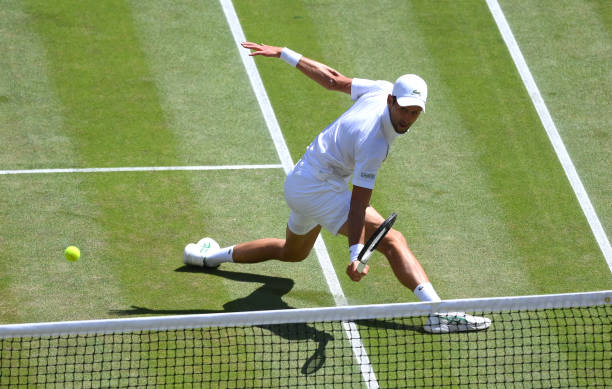Last year, Novak Djokovic came one match away from winning the Calendar Grand Slam. The undisputed best player on the planet was nearly untouchable when it mattered most, beating all challengers, usually with ease. Yes, the pressure did seem to get to him in the US Open final against Daniil Medvedev, but all in all Djokovic was winning more Slams than not, and seemed inevitable to run away with the all-time Major record when all was said and done.
Fast forward less than a year, and things look less clear. Djokovic was not allowed to compete at the Australian Open, and current indications are that he will not be allowed at this year’s US Open either. Meanwhile, Rafael Nadal has won two straight Majors for a record 22 titles, while Djokovic was still stuck at 20. And, perhaps, Djokovic will only be allowed to compete at two Majors per year for the foreseeable future.
None of that mattered at Wimbledon, though. The Serbian loves the hallowed grounds of the All-England Club, and he showed it yet again this year. He faced scares, yes–more than usual–but still was never really in danger of losing a match. Djokovic came into Wimbledon intending to tie Pete Sampras and William Renshaw with seven titles (one shy of Roger Federer’s eight), and that’s exactly what he did. Nick Kyrgios was merely the last obstacle in his way. Like other matches this tournament, the Serbian was challenged, but yet again couldn’t be beaten.
Novak Djokovic vs Nick Kyrgios
The match started out relatively calmly, with both players holding serve. It was immediately apparent, though, that this wouldn’t be an easy match for Djokovic. Kyrgios won most of the early extended rallies and was up for the challenge. The Australian clearly wasn’t at a disadvantage from the baseline. Coming into the match, perhaps we expected Djokovic to be better from the baseline. That wasn’t the case, and it was apparent early.
What was also apparent early was that Kyrgios would be serving lights-out. The Australian blasted aces past Djokovic and generally backed up his serve. Djokovic couldn’t come close to breaking the Kyrgios serve. Add that to one poor service game by Djokovic–ended by a double fault–which sent the first set the Australian’s way.
Still, Djokovic is perhaps the best problem-solver in the history of tennis for good reason. As the second set went on, Djokovic began to read the Kyrgios serve better. The Serbian got more returns in play, and began to win more of the rallies. Kyrgios, meanwhile, began to get into more disputes with himself and his camp. This ended with Djokovic breaking the Kyrgios serve just once in the second set, but it was enough. The Serbian held off nerves and numerous break points in the 5*-3 game, but he managed to serve it out. Suddenly, we were in a best-of-three match the rest of the way.
Third and Fourth Sets
The third set proceeded as the second set went. Djokovic was getting a fair number of returns in play, but Kyrgios served big enough and played well enough from the baseline that he couldn’t be broken. The Australian did receive a code violation (for a combination of language and crowd abuse, it seemed), which upset him but he played, seemingly unfazed. Then, at 4-4, Kyrgios cracked. He led 40-0, but some good Djokovic returns finally frustrated him, and five straight points gave the Serbian the break. Djokovic wasn’t perfect in the next service game, but some missed returns made it irrelevant. The Serbian was one set away.
The fourth set continued, with both players playing well. Djokovic was perhaps a bit better on return and from the baseline, but not by enough to force a break. Neither player managed to even find a break point opportunity (no game even went to deuce), so we proceeded to a tiebreak.
Kyrgios double-faulted to open the tiebreak (he went big on a second serve that was about three millimeters out), but Djokovic gave the minibreak back with a very poor forehand two points later. The Djokovic return was impeccable, though, winning the next two points on the Kyrgios serve. That 4-1 lead proved to be insurmountable. Kyrgios seemed frustrated, but Djokovic’s level was too good anyway. The Serbian took the tiebreak, the match, his fourth consecutive Wimbledon title, and seventh overall.
What’s Next?
In what would have been unimaginable just a few years ago, Roger Federer now sits in third on the all-time Grand Slam list. He trails Rafael Nadal and Novak Djokovic, and with his knee issues seems unlikely to catch them. Djokovic, though, looked like he would run away with the record a year ago. Now he still trails Nadal by one Major, and might not be able to compete at another one until nest year’s French Open. With no ranking points at Wimbledon this year (due to the ban on Russian players), Djokovic will actually fall to #7 in the world. The Serbian hasn’t been that low in the rankings in over 15 years–since June 2007.
All that being said, Djokovic is clearly still the best player in the world right now. Perhaps he trails Nadal on clay, but Djokovic should be treated as a favorite every time he steps on the court. Whether the rules and his vaccination status will let him take his rightful place in history is, perhaps, an open question. And it’s truly one of Djokovic’s own choosing. But whenever he plays, at least for now, we should expect him to win.
And what of Nick Kyrgios? As with Kyrgios, I think the answer always is a simple “who knows”? The Australian can likely do almost anything he wants on a tennis court. In his career so far, though, he hasn’t been able to want it long enough to achieve long-term success. Whether he ever changes his mind on that remains to be seen.
Main Photo:
Embed from Getty Images






